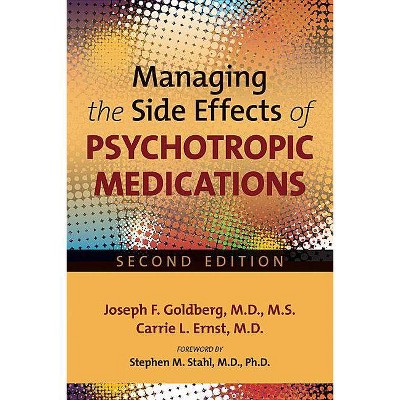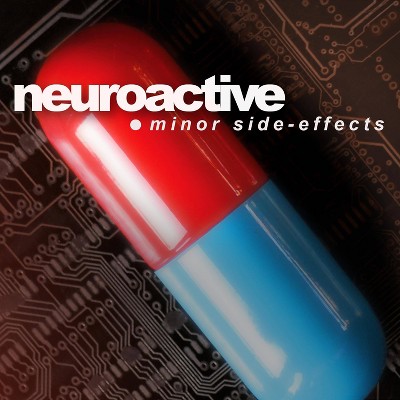Managing the Side Effects of Psychotropic Medications - 2nd Edition by Joseph F Goldberg & Carrie L Ernst (Paperback)

Similar Products
Products of same category from the store
AllProduct info
<p/><br></br><p><b> About the Book </b></p></br></br><p>This second edition of the guide features updated information about newer psychotropic agents, as well as new drugs to help manage iatrogenic weight gain, metabolic dysregulation, involuntary movement disorders, and other common problems.</p><p/><br></br><p><b> Book Synopsis </b></p></br></br><p>Information about new psychotropic drugs, a summary of advances in knowledge about identifiable risk factors for adverse effects, and updated recommendations on viable "antidote" management strategies -- including novel pharmacotherapies for tardive dyskinesia and newer agents for weight loss -- are among the features of this new, second edition of Managing the Side Effects of Psychotropic Medications.</p><p>Where other psychopharmacology textbooks -- and, indeed, most internships and residencies in psychiatry -- lack a solid basis in primary care medicine, this guide bridges that educational gap, offering a thorough examination of all the effects of taking a psychotropic drug as well practical clinical advice on how to manage complications that arise.</p><p>The book is divided into three parts: The first deals with global issues that affect the assessment and formulation of possible adverse effects, as well as with pertinent concepts related to basic pharmacology, physiology, and medical monitoring. The second part presents information organized by individual organ systems or specific medical circumstances. The final part focuses on summary recommendations covering all the material presented in the book and is followed by helpful appendixes and self-assessment questions and resources for practitioners.</p><p>This new edition includes: - Updated summaries about what psychiatrists should know regarding drug-drug interactions, iatrogenic cardiac arrhythmias, drug pressor effects and orthostatic hypotension, and drug rashes; as well as updated discussions on avoiding lithium nephrotoxicity, handling adverse effect emergencies, and understanding new FDA classifications about drug safety during pregnancy- An expanded discussion on the strengths and limitations of pharmacogenetic testing to predict adverse drug effects, as well as information about new treatments for sexual dysfunction, sleep disturbances, cognitive complaints, and other maladies- Revised summary tables to aid rapid assessment and management- An expanded section on supplemental resources- An updated and expanded self-assessment section with more key questions </p><p>Busy clinicians will find in Managing the Side Effects of Psychotropic Medications an accessible reference that provides both scientific and scholarly discussion of the consequences of drug therapies they may prescribe (or avoid), the range of available strategies to effectively manage adverse effects, and the scientific and practical implications of their treatment decisions.</p><p/><br></br><p><b> From the Back Cover </b></p></br></br><p>Where other psychopharmacology textbooks -- and, indeed, most internships and residencies in psychiatry -- lack a solid basis in primary care medicine, Managing the Side Effects of Psychotropic Medications bridges that educational gap, offering a thorough examination of all the effects of taking a psychotropic drug, as well practical clinical advice on how to manage complications that arise.</p><p>This second edition of the guide features updated information about newer psychotropic agents, as well as new drugs to help manage iatrogenic weight gain, metabolic dysregulation, involuntary movement disorders, and other common problems. New tables and figures have also been added to aid rapid assessment and management, and the self-assessment section has been updated and expanded with more key questions to facilitate knowledge retention. </p><p>Regardless of their particular expertise, all clinicians will benefit from the rigorous scientific and scholarly discussion they will find in this edition of the consequences of drug therapies they prescribe, the range of available strategies to effectively manage adverse effects, and the scientific and practical implications of their treatment decisions.</p><p/><br></br><p><b> Review Quotes </b></p></br></br><br><p>This is an admirable work. It lays a solid foundation of pharmacological knowledge and then builds upon it by reviewing various organ systems. The chapters are clear, concise, and helpful. Readers can be confident that they will be able to identity and manage the various side effects that they will encounter. This is all accomplished without overwhelming readers, which can so often occur when exploring potential side effects of medications. I highly recommend this book. The second edition was necessary given the newer medications as well as the research findings that have emerged since the first edition.</p>--Aaron Plattner, M.D. "Doody's Book Reviews "<br><p/><br></br><p><b> About the Author </b></p></br></br><p>Joseph F. Goldberg, M.D., M.S., is Clinical Professor of Psychiatry at the Icahn School of Medicine at Mount Sinai in New York, New York.</p><p>Carrie L. Ernst, M.D., is Associate Professor of Psychiatry and Medical Education at the Icahn School of Medicine at Mount Sinai in New York, New York.</p>
Price History
Price Archive shows prices from various stores, lets you see history and find the cheapest. There is no actual sale on the website. For all support, inquiry and suggestion messagescommunication@pricearchive.us



















